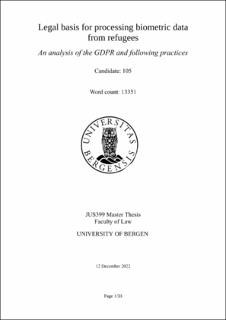| dc.contributor.author | Løbach, Marie Tamber | |
| dc.date.accessioned | 2023-04-03T06:00:39Z | |
| dc.date.available | 2023-04-03T06:00:39Z | |
| dc.date.issued | 2022-12-12 | |
| dc.date.submitted | 2023-01-23T09:29:10Z | |
| dc.identifier.uri | https://hdl.handle.net/11250/3061608 | |
| dc.description.abstract | Protection of personal data is the most important legal standard when collecting and processing biometric data from individuals. Iris and fingerprint scans are commonly used as identification in humanitarian action. This in formation falls under special categories of personal data in accordance with Article 9(1) of the GDPR, and needs to be processed properly to ensure the right to the protection of personal data and minimize risks. The problem discussed in this thesis is related to processing of biometric data from refugees done by NGOs working in humanitarian action, specifically the processing of data from iris scanning technology. The usage of biometric data is becoming more common, and raises several questions in relation to how it can be processed for use in humanitarian action. | |
| dc.language.iso | eng | |
| dc.publisher | The University of Bergen | |
| dc.rights | Copyright the Author. All rights reserved | |
| dc.subject | biometric data | |
| dc.subject | INGO | |
| dc.subject | personal data | |
| dc.subject | processing | |
| dc.subject | privacy | |
| dc.subject | data protection | |
| dc.subject | GDPR | |
| dc.subject | special categories of personal data | |
| dc.subject | NGO | |
| dc.subject | EU-law | |
| dc.subject | refugee | |
| dc.title | Legal basis for processing biometric data from refugees - An analysis of the GDPR and following practices | |
| dc.type | Master thesis | |
| dc.date.updated | 2023-01-23T09:29:10Z | |
| dc.rights.holder | Copyright the Author. All rights reserved | |
| dc.description.degree | Masteroppgave | |
| dc.description.localcode | JUS399 | |
| dc.description.localcode | MAJUR | |
| dc.description.localcode | MAJUR-2 | |
| dc.subject.nus | 737102 | |
| fs.subjectcode | JUS399 | |
| fs.unitcode | 16-0-0 | |
